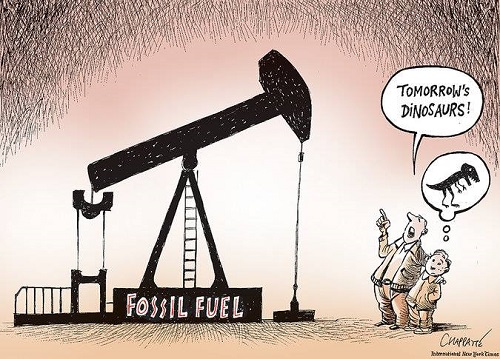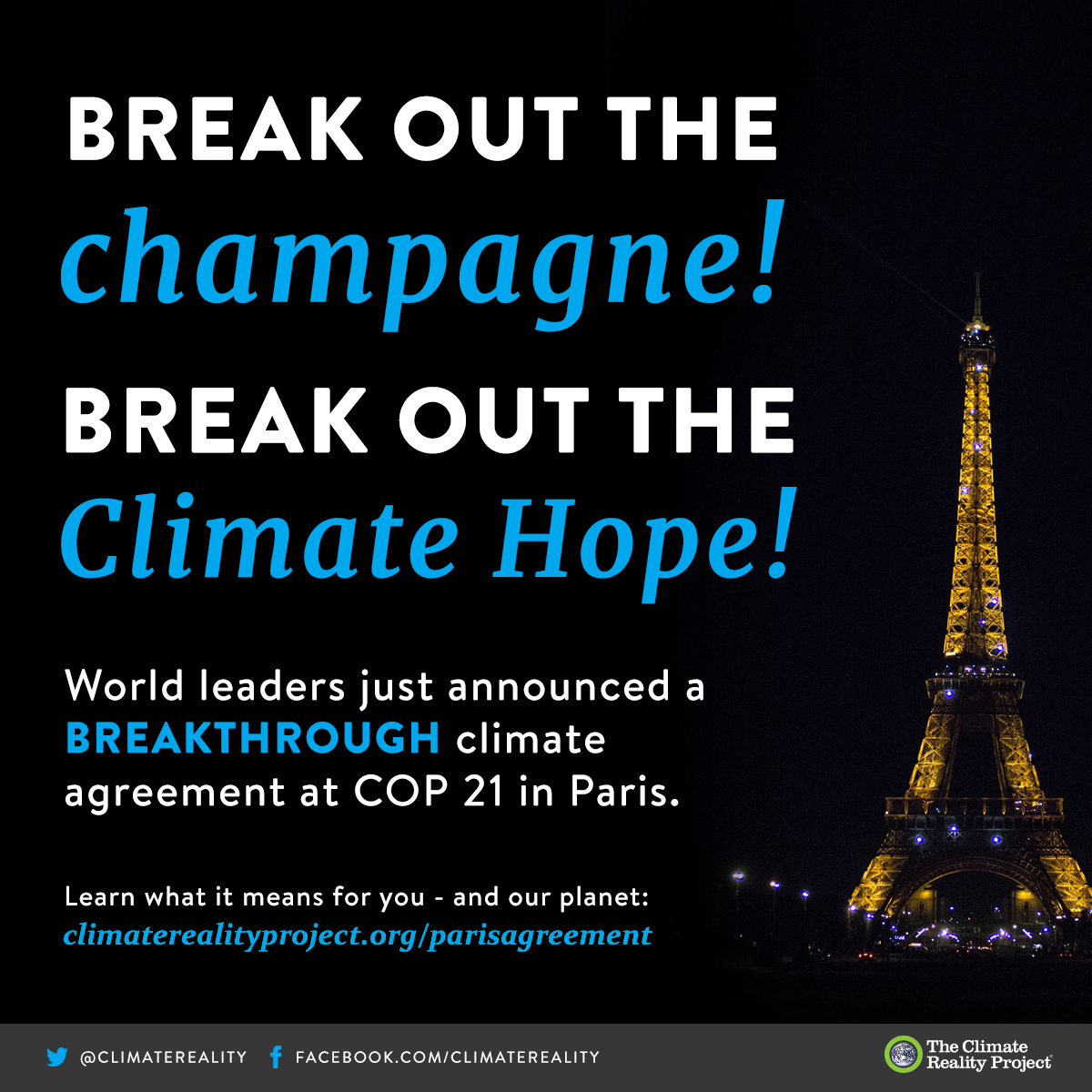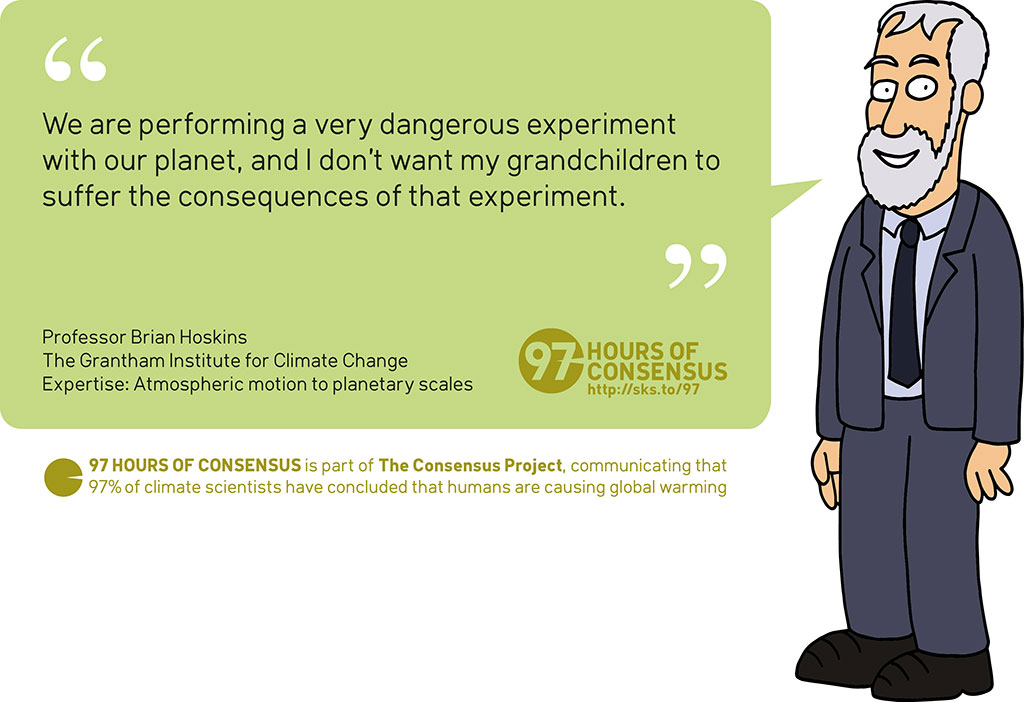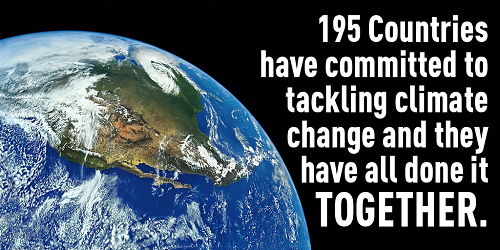2015 SkS Weekly Digest #50
Posted on 13 December 2015 by John Hartz
SkS Highlights... Toon of the Week... Quote of the Week... SkS in the News... Coming Soon on SkS... Poster of the Week... SkS Week in Review... 97 Hours of Consensus...
Credit: tcktcktck
SkS Highlights
Betting against global warming is a sure way to lose money by Dana Nuccitelli (Climate Consensus - 97%, The Guardian) attracted the highest number of comments among the articles posted on SkS during the past week. The Road to Two Degrees, Part Three: Equity, inertia and fairly sharing the remaining carbon budget by Andy Skuce garnered the second highest number.
Toon of the Week

Hat tip to I Heart Climate Scientists
Quote of the week
As the UN Secretary General Ban Ki-Moon said to world leaders this evening in Paris, “We have an agreement. It is a good agreement. You should all be proud.”
“Now we must stay united — and bring the same spirit to the crucial test of implementation,” he said.
“That work starts tomorrow.”
All the Reasons the Paris Agreement is a Huge Freaking Deal for the Climate by Carol Linnitt, DeSmog Canada, Dec 12, 2015
SkS in the News
In his alphr article, Arnold Schwarzenegger just came up with a climate change argument that’s hard to argue with, Alan Martin states:
That shouldn’t be a surprise. As John Cook, author of Climate Change Science: A Modern Synthesis, told Reddit in a recent Ask Me Anything: “A number of empirical studies (including my own PhD research) have found an extremely strong correlation between conservative political ideology and denial of science. And randomised experiments have demonstrated a causal relationship between the two.”
Coming Soon on SkS
- The Paris agreement signals that deniers have lost the climate war (Dana)
- Myles Allen: Can we hold global temperatures to 1.5C? (Carbon Brief)
- December 2015 Floods: a floating postcard from the UK (John Mason)
- Guest Post (John Abraham)
- Why climate skeptics are wrong (Michael Shermer)
- 2015 SkS Weekly News Roundup #51 (John Hartz)
- 2015 SkS Weekly Digest #51 (John Hartz)
Poster of the Week

SkS Week in Review
- 2015 SkS Weekly News Roundup #50 by John Hartz
- New Peter Sinclair video: What Exxon Knew by greenman360
- Wind energy is a key climate change solution by John Abraham (Climate Consensus - 97%, The Guardian)
- The Road to Two Degrees, Part Three: Equity, inertia and fairly sharing the remaining carbon budget by Andy Skuce
- Betting against global warming is a sure way to lose money by Dana Nuccitelli (Climate Consensus - 97%, The Guardian)
- Analysis: the key announcements from Day 1 at COP21 by Carbon Brief staff
- 2015 SkS Weekly Digest #49 by John Hartz
97 Hours of Consensus: Brian Hoskins
































 Arguments
Arguments































COP21 conclusion coincided with a very notable global milestone.
They've just updated na average global monthly CO2 at NOAA. But IMO it's not the monthly value but it is the trend which is the most important metric. Find the tend in the last column of the monthly data and note that 400ppm was breached (400.17) for the first time in october 2015.
This is the true global average CO2 concentration (excluding seasonal fluctuations), and this is the first time we as humanity (not a selected site such as in the Arctic or MaunaLoa) really reached 400. A milestone not to be proud of, considering it was (as you scroll the data up) still <370 at the turn of the certury and 350 just ten years earlier as I remember it from my primary school books at the time.
chriskoz,
I have also been following the CO2 levels reported by NOAA. The CO2 Movie presents the understood CO2 levels through the past 800,000 years. Until the recent spike due to human impacts the maximum CO2 level was 300 ppm about 300,000 years ago.
So, ever since human impacts pushed the CO2 levels above 300 ppm we have been at CO2 levels that humanity, and much of the life on this planet that humanity has adapted to be a (supposedly) sustainable part of, had never previously experienced.
Forgot to link the NOAA CO2 Movie in my previous comment.
chris mentioned trend. I was wondering, given the much lauded reports that CO2 emissions stalled this year:
When might we expect such a thing, if it is real, to show up in a discernable way, in the atmospheric CO2 consentration data?
Can we factor out the effects of the current El Nino to determine whether there there is an underlying flattening of the Keeling Curve that is being hidden by this relatively short term phenomenon?
Or would we just have to wait many years to see if there is a change in the long-term trend, and if so, how many years?
Thanks ahead of time for any light anyone can throw in my general direction on this.
wili @4.
CO2 emisions were rising at something like 200Mt(C) a year. If the rate levels off to zero, that would convert into a drop in atmospheric CO2 by 0.05ppm(v) within the measured annual increase of some 2.1ppm+/-0.64ppm(2sd).
Mind, cutting emissions by 200Mt(C) a year every year, which will still not be immediately noticable in terms of atmospheric levels (possibly 5 or so years to do than), would reduce emissions to zero in 50 years, so it isn't a million miles from the required cuts.
wili @4 re "given the much lauded reports that CO2 emissions stalled this year" [unquote]
I feel distinctly uneasy about your description of "stalled" emissions. Were you meaning that CO2 emissions stalled, as in a plane stalling in mid-air? Surely not ~ since that would imply an actual reduction of emission rate.
If you meant a levelling of emission rate, then that is very far from comforting, since that is another way of saying that our buildup of (total) emitted CO2 is still rising rapidly.
Eclectic, it's better than CO2 emissions not leveling off.
Yep, we still need to see global emissions go down, but leveling off is a step in the right direction. Even the initial pledges just agreed at COP21 should start to drive global reductions in a few years... and then those pledges are supposed to be improved every five years.
Thanks for the responses. Your numbers are very interesting, MA. Can you give some links or formulas for how you derived them so I can share them more convincingly elsewhere? Thanks.
Eclectic, I'm sorry that you don't like my wording, but the news articles I've seen actually use stronger language than that: The world's CO2 emissions fell in 2015
Perhaps I'm missing your point?
I don't, by the way, necessarily trust these proclamation, since they seem to be based mostly on China's self reported data, data that has been norious in the past for under-reporting and for major 'adjustments' upward after the headlines have all been printed.
I was really posing what (to me) is mostly a hypothetical--if these reports were true, when would we expect to see them reflected in the atmospheric concentration data, and how large would that effect be?
Wili @8.
All pretty basic stuff.
I used data from CDIAC (FF+cement) to check the annual increases in emissions. I didn't but you could refine that by adding Land-Use Change data.
1ppm requires an extra 2.13Gt(C) of CO2 in the atmosphere, with an airborne fraction of roughly 50%.
The atmospheric increase data was from the NOAA global CO2 page from which the sd was calculated.